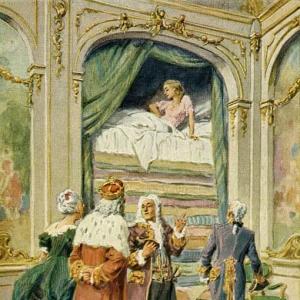Reading time: 3 min
A man and his wife were once sitting by the door of their house, and they had a roasted chicken set before them, and were about to eat it together. Then the man saw that his aged father was coming, and hastily took the chicken and hid it, for he would not permit him to have any of it. The old man came, took a drink, and went away. Now the son wanted to put the roasted chicken on the table again, but when he took it up, it had become a great toad, which jumped into his face and sat there and never went away again, and if any one wanted to take it off, it looked venomously at him as if it would jump in his face, so that no one would venture to touch it. And the ungrateful son was forced to feed the toad every day, or else it fed itself on his face; and thus he went about the world without knowing rest.
 Learn languages. Double-tap on a word.Learn languages in context with Childstories.org and Deepl.com.
Learn languages. Double-tap on a word.Learn languages in context with Childstories.org and Deepl.com.Backgrounds
Interpretations
Adaptions
Summary
Linguistics
„The Ungrateful Son“ is a lesser-known fairy tale collected by the Brothers Grimm, Jacob and Wilhelm, in their anthology „Grimms‘ Fairy Tales.“ The Brothers Grimm were German scholars and authors who lived in the late 18th and early 19th centuries. They are best known for their extensive collection of German and European folktales, which they compiled in an attempt to preserve the oral storytelling traditions of their time.
Grimms‘ Fairy Tales, also known as „Children’s and Household Tales“ (German: „Kinder- und Hausmärchen“), is a collection of hundreds of stories gathered from various sources, including friends, family, and published works. The tales often contain moral lessons and cautionary messages, conveyed through magical and fantastical elements. Some of the most famous stories in the collection include „Cinderella,“ „Hansel and Gretel,“ „Rapunzel,“ „Snow White,“ and „The Frog Prince.“
While „The Ungrateful Son“ may not be as well-known as some other tales in the Grimms‘ collection, it carries similar themes and motifs that can be found throughout their works, such as the importance of family values, respect for elders, and the consequences of one’s actions. The story also features a blend of realistic and magical elements, a characteristic often seen in their other fairy tales.
The tale of „The Ungrateful Son“ by Brothers Grimm offers several interpretations that convey moral lessons and highlight certain values.
The importance of gratitude and respect for elders: The son’s ungrateful behavior towards his father demonstrates a lack of respect and gratitude for the care and love he received while growing up. The story serves as a reminder to honor and appreciate our elders, who have devoted their lives to our well-being.
The consequences of selfishness: The son’s selfish act of hiding the chicken to avoid sharing it with his father led to his own suffering. The story emphasizes the negative consequences of selfish behavior and encourages readers to be more generous and empathetic towards others.
Family values and sharing: The tale underlines the importance of strong family bonds and sharing with loved ones. By hiding the chicken from his father, the son not only deprived his father of a meal but also weakened the family bond.
The concept of karma: The transformation of the chicken into a toad can be seen as an embodiment of the concept of karma, where one’s actions determine their future experiences. The son’s cruel treatment of his father led to his own suffering, teaching readers that negative actions can have repercussions.
The transformative power of compassion: The toad’s attachment to the son’s face serves as a constant reminder of his ungratefulness and unwillingness to share. By being forced to care for the toad, the son is given an opportunity to learn compassion and empathy, allowing for personal growth and redemption.
Overall, the tale of „The Ungrateful Son“ offers valuable lessons about gratitude, respect, generosity, and the consequences of one’s actions, serving as a cautionary tale for readers of all ages.
There are several adaptations and retellings of the fairy tale „The Ungrateful Son“ from Brothers Grimm, across different mediums including literature, theatre, and film. Here are a few examples.
„The Ungrateful Son“ is retold in the children’s book „The Thankful Book“ by Todd Parr, which is a modern take on the classic fairy tale that focuses on the importance of being grateful.
In the musical „Once Upon a Mattress,“ the character Prince Dauntless is based on the ungrateful son from the fairy tale. He is cursed with an inability to sleep until he finds a truly grateful woman to marry.
The fairy tale is also adapted in the Japanese anime „The World God Only Knows,“ where the main character, Keima, is cursed with the same affliction as the ungrateful son and must find a way to transfer his wounds to someone else.
The fairy tale is retold in the horror movie „The Ungrateful Dead“ (2007), which tells the story of a young man who inherits a family estate and becomes possessed by the spirits of his ungrateful ancestors.
In the video game „The Witcher 3: Wild Hunt,“ there is a quest called „The Lord of Undvik“ that is based on the fairy tale. In the quest, the player must help a cursed man who has been afflicted with the same sores as the ungrateful son.
These are just a few examples of the many adaptations and retellings of „The Ungrateful Son“ from Brothers Grimm that have been created over the years.
In the fairy tale „The Ungrateful Son“ by Brothers Grimm, a man and his wife were about to enjoy a roasted chicken together when they noticed the man’s elderly father approaching. Out of selfishness and unwillingness to share, the man quickly hid the chicken before his father could see it. The old man stopped by, took a drink, and left without being offered any food.
As the son attempted to bring the chicken back to the table, it had transformed into a large, menacing toad. The toad leapt onto the son’s face and refused to leave. Anyone who tried to remove the toad was met with a threatening, venomous glare, deterring them from touching it. Consequently, the ungrateful son was forced to feed the toad daily or suffer as it fed on his face. This punishment followed him relentlessly, leaving him to wander the world without peace or rest.
Linguistic analysis of „The Ungrateful Son“ by the Brothers Grimm involves examining the text’s structure, language, and style to understand how these elements work together to convey its themes and moral lessons. This fairy tale is brief and straightforward, yet it carries significant symbolic weight, typical of the Brothers Grimm.
Narrative Structure
Exposition: The setting is established immediately with „A man and his wife were once sitting by the door of their house,“ introducing the main characters and a seemingly normal situation.
Conflict: The conflict arises when the man sees his aged father approaching and selfishly hides his food. This action sets the stage for the ensuing moral lesson.
Resolution: The resolution is swift and exhibits the consequences of the son’s behavior when the chicken transforms into a toad that permanently affixes itself to his face, serving as a constant reminder of his ingratitude.
Language and Style
Simplicity: The story uses simple, direct language typical of folktales, making it accessible to audiences of all ages. This style ensures the moral is easily comprehensible.
Symbolism: The roasted chicken symbolizes abundance or generosity, while its transformation into a toad represents the repercussions of greed and ingratitude. The toad’s venomous look and refusal to leave signify the inescapable nature of the son’s guilt.
Repetition: The phrase „into his face“ occurs multiple times, emphasizing the personal and direct consequence of the son’s actions—his moral failing is literally and figuratively rubbed in his face.
Themes
Ingratitude and Consequences: The tale underscores the theme of ingratitude towards one’s parents, a common motif in many cultures. The son’s action of hiding the chicken from his father leads to a literal manifestation of his guilt and ingratitude.
Social and Familial Duty: By presenting the father’s arrival and the son’s reaction, the story emphasizes the ethical expectations of caring for and respecting parents.
Moral Retribution: The transformation of the chicken into a toad serves as a physical embodiment of poetic justice, a reminder that one’s actions can have long-lasting, visible consequences.
Cultural Context: During the Brothers Grimm’s time, tales often carried strong moral lessons and cultural values surrounding familial piety and respect for elders. This narrative is a reflection of societal norms where family hierarchies and responsibilities were pivotal.
Overall, „The Ungrateful Son“ relies on its straightforward narrative and linguistic simplicity to deliver a moral lesson about the pitfalls of selfishness and ingratitude, with the transformation serving as a vivid illustration of the consequences of one’s actions.
Information for scientific analysis
Fairy tale statistics | Value |
|---|---|
| Number | KHM 145 |
| Aarne-Thompson-Uther-Index | ATU Typ 980D |
| Translations | DE, EN, DA, ES, FR, PT, IT, JA, NL, PL, RU, TR, VI, ZH |
| Readability Index by Björnsson | 41.3 |
| Flesch-Reading-Ease Index | 68 |
| Flesch–Kincaid Grade-Level | 12 |
| Gunning Fog Index | 14.6 |
| Coleman–Liau Index | 6.1 |
| SMOG Index | 9 |
| Automated Readability Index | 12 |
| Character Count | 817 |
| Letter Count | 625 |
| Sentence Count | 5 |
| Word Count | 168 |
| Average Words per Sentence | 33,60 |
| Words with more than 6 letters | 13 |
| Percentage of long words | 7.7% |
| Number of Syllables | 208 |
| Average Syllables per Word | 1,24 |
| Words with three Syllables | 5 |
| Percentage Words with three Syllables | 3% |

 Facebook
Facebook  Whatsapp
Whatsapp  Messenger
Messenger  Telegram
Telegram Reddit
Reddit














